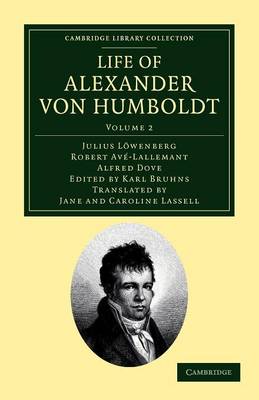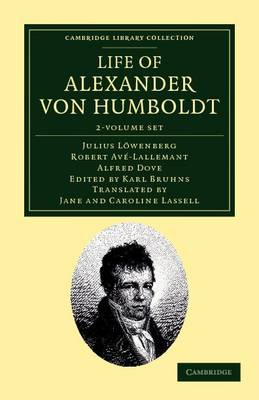Cambridge Library Collection - Earth Science
1 primary work • 4 total works
Volume 2
Life of Alexander von Humboldt
by Julius Lowenberg, Robert Ave-Lallemant, and Alfred Dove
Published 17 February 2010
Alexander von Humboldt (1769–1859) was a naturalist, explorer and philanthropist now well known for his multidisciplinary approach to science. First published in English in 1873, this two-volume biography was translated from the German edition of 1872, edited by Karl Bruhns, which had been compiled in commemoration of the centenary of Humboldt's birth. Incorporating numerous extracts of Humboldt's own warmly written letters and anecdotes from his many acquaintances, it charts his travels in South America, Asia and Europe. Volume 2 covers his later life, exploring his impecunious period in Paris at the École Polytechnique, where he shared rooms with the famous French chemist Gay-Lussac, and later, his close association with King Frederick William IV of Prussia. Ideal for students and researchers in the history of science, this is a minutely detailed and compelling insight into the life of the man behind the scientist.
Life of Alexander von Humboldt 2 Volume Set
by Julius Lowenberg, Robert Ave-Lallemant, and Alfred Dove
Published 8 March 2012
Alexander von Humboldt (1769-1859) was a naturalist, explorer and philanthropist now well known for his multidisciplinary approach to science. First published in English in 1873, this two-volume biography was translated from the German edition of 1872, edited by Karl Bruhns, which had been compiled in commemoration of the centenary of Humboldt's birth. Incorporating numerous extracts of Humboldt's own warmly written letters and anecdotes from his many acquaintances, it charts his travels in South America, Asia and Europe. Volume 1 covers his early exploratory trips and some of his lesser known exploits, including becoming Superintendent of Mines in Northern Bavaria and his research on the sixteenth-century eruption of Nevado del Altar in Ecuador. Volume 2 covers his later life, exploring an impecunious period in Paris at the Ecole Polytechnique, where he shared rooms with the French chemist Gay-Lussac, and his later association with Frederick William IV of Prussia.
Life of Alexander von Humboldt: Volume 2
by Julius Loewenberg, Robert Ave-Lallemant, and Alfred Dove
Published 5 May 2012
Alexander von Humboldt (1769–1859) was a naturalist, explorer and philanthropist now well known for his multidisciplinary approach to science. First published in English in 1873, this two-volume biography was translated from the German edition of 1872, edited by Karl Bruhns, which had been compiled in commemoration of the centenary of Humboldt's birth. Incorporating numerous extracts of Humboldt's own warmly written letters and anecdotes from his many acquaintances, it charts his travels in South America, Asia and Europe. Volume 2 covers his later life, exploring his impecunious period in Paris at the École Polytechnique, where he shared rooms with the famous French chemist Gay-Lussac, and later, his close association with King Frederick William IV of Prussia. Ideal for students and researchers in the history of science, this is a minutely detailed and compelling insight into the life of the man behind the scientist.
Life of Alexander von Humboldt: Volume 1
by Julius Loewenberg, Robert Ave-Lallemant, and Alfred Dove
Published 5 May 2012
Alexander von Humboldt (1769–1859) was a naturalist, explorer and philanthropist now well known for his multidisciplinary approach to science. First published in English in 1873, this two-volume biography was translated from the German edition of 1872, edited by Karl Bruhns, which had been compiled in commemoration of the centenary of Humboldt's birth. Incorporating numerous extracts of Humboldt's own warmly written letters and anecdotes from his many acquaintances, it charts his travels in South America, Asia and Europe. Volume 1 covers his early exploratory trips and some of his lesser-known exploits, including becoming Superintendent of Mines in Northern Bavaria, his research on the sixteenth-century eruption of Nevado del Altar in Ecuador and his friendship with the young Prince William of Prussia. Of interest to students and researchers in the history of science, this is a minutely detailed and compelling insight into the life of the man behind the scientist.


